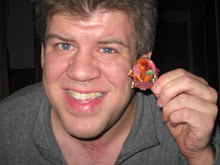Monday, June 13, 2011
REVIEW: The Tree of Life
Reviewing The Tree of Life feels like walking out on a limb. It's exciting and scary.
If you praise it effusively, some moviegoers will declare you an artsy fart who doesn't like anything fun. On the other hand, if you criticize it, you run the risk of being called a troglodyte who simply didn't "get it."
However, I pride myself on being able to balance the scales of an argument (I am a Libra, after all.) I freely admit I didn't "get" much of The Tree of Life. And I didn't expect to. To be able to "get it" after only one viewing would only diminish the impact of this often overwhelming film. At the same time, I believe a film should be judged not so much on what it tries to achieve, but on what it actually accomplishes. And on that score, writer-director Terrence Malick's reach exceeds his grasp.
Malick, whose short filmography includes Badlands, Days of Heaven, The Thin Red Line and The New World, has never been big on plot. Some may claim that "nothing happens" in his stories, but Malick has always emphasized mood over narrative. To him, what's important is not so much what happens but what his characters feel. And that feeling is often intensely powerful.
More than anything else, The Tree of Life is a memory album, an evocation of a time of lost innocence. The film recalls 1950s Texas in glowing visuals, most often seen from the point of view of a child. Malick keeps his camera low to the ground as it gazes in wonder, or sometimes confusion. The movie's eye darts about restlessly with our protagonist (Hunter McCracken), whose soul is torn between a loving but stern father (Brad Pitt) and his free-spirited mother (Jessica Chastain, who has a lovely ethereal presence).
Because the emotions of those scenes are so stirring, I wanted the entire film to leave me breathless of wonder. But it often falls unnervingly short. A framing device featuring Sean Penn as the grown son never connects emotionally at all, and a climactic scene on a beach seems more ripped from the frames of Fellini than something truly otherwordly.
I also felt torn about the "creation of life" scenes, which struck me as an overly elliptical melding of the "Rite of Spring" sequence from Fantasia (which, like The Tree of Life, features dinosaurs), and the "Dawn of Man" scenes of 2001: A Space Odyssey. I think Malick is trying to say something akin to what Casablanca called the problems of a few little people not amounting to a hill of beans in this crazy world. But I'm not sure that having sections of the movie look like an elaborate National Geographic documentary is the best way to put that idea across.
At the same time, whether the screen is showing an exploding star or a child on a swing, the imagery is never less than breathtaking. Lensed by Emmanuel Lubezki, The Tree of Life is one of the most gorgeous films ever shot. Not just by Malick or in this decade, but in all the history of film. It's worth seeing for the visuals alone. And I will be seeing it again.
Perhaps I will take something different away from it on repeat viewings. For now, I would stop short of calling The Tree of Life a great film, but it is a great experience. When the film misses it frustrates. But when it succeeds, it soars.
GRADE: B+
Labels:
Reviews: In theaters
Subscribe to:
Post Comments (Atom)


1 comment:
I think you're on the right track with the Casablanca analogy, although it's not so much that these folks are so insignificant as to not matter, as I think it is that Malick is echoing the questions Pitt's character asks toward the beginning of the film. "I made him feel shame. Why shame?" "I'd make him sit at the piano with me and criticize the way he turned the pages." et al. The universe is so vast, and so much has come before us and will follow -- our lives are so brief, why should we squander it on pettiness, anger, or greed? There is a battle between Pitt and Chastain's characters -- he sees her as naive, because he is more concerned with how to get ahead in the world, and she is more concerned with innocence, joy, love, and their relationship with God and all His creation. In terms of influence and impact on the children's lives, it's fair to say one of them has more in the short-term, but the film begins at a time when one of their children is perhaps reevaluating that.
Post a Comment